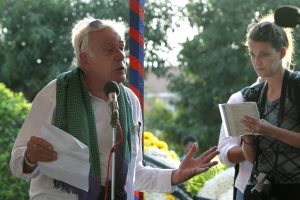Tim Page, the British-Australian war photogr
Page made his name as a war photographer in Vietnam. He was daring, some said stupidly so. He was wounded four times and lost a piece of his brain but survived before covering conflicts in Cambodia and Afghanistan, where he also worked as a United Nations Photographic Peace Ambassador.
His is an enduring legacy for a man many expected would be lucky to live beyond 30.
But luck is a fickle mistress. Few pushed themselves as hard as Page did. His camera was always at his side. He shot, wrote, and filed on time. He disdained photographers who left their cameras at home and loathed mundanity.
A child of World War II, Page was born John Spencer Russell in 1944. His father, a British sailor, had been killed and Page, who never knew his mother, was adopted out.
He left England aged 17, journeying through the Middle East and onto Indochina, where war was erupting. Page became good friends with the Australian combat cameraman Neil Davis and American photographer Sean Flynn.
“Once you’ve been to war, it’s the biggest thing in your life,” he once said. “You form mateships, friendships, which are tougher, harder, more cemented than with your family. They become your brothers and your sisters.”
Page had an ability to charm, which was honed by his sense of fun and self-belief – he always backed himself – and this was on-show at his exhibitions, book launches, and even on Phnom Penh’s riverfront, where he encouraged street vendors to sell pirated copies of his publications.
Those books, a dozen of them, were the source of his fame, inspiring and enticing the next generation of photographers and journalists. And Page reveled in his celebrity, an annoying point for the purists in an industry not without its petty jealousies, holding court and indulging young reporters in the foreign correspondent clubs of Hong Kong, Bangkok, and Phnom Penh, often with a doobie in one hand and a drink in the other.
He managed the great leap from analogue to digital and, importantly, he was prominent among veterans with unfinished business in Indochina.
For Page that meant finding out what happened to his former colleagues Flynn and Dana Stone, who disappeared on the frontlines in Cambodia, along Highway One, in 1970.
Cambodia is littered with bones from a 30-year war and the search for Flynn and Stone had taken a macabre turn. By 2010, treasure hunters were scouring the countryside and two of them dubiously claimed to have found Flynn’s remains.
“They have fired a BB gun into a hornet’s nest,” Page told me in nearby Saigon as the U.S. embassy in Phnom Penh revealed the bones recovered were not that of a Caucasian.
“I feel very sorry for the poor bugger who they found,” said Page.
“That skull belonged to someone. That someone had a family, a mother and a father. This was a person. And they destroyed the evidence.”
Page’s adventures were many. In 1994 he joined an expedition to find the elusive (possibly extinct) Kouprey, alongside the former publisher of the Phnom Penh Post, Michael Hayes.
Hayes recalled walking 20 kilometers on the first day of the expedition in the remote province of Mondulkiri. It was the peak of the hot season; the team had no water, and Page had severe dehydration. His heart was acting up. He was crying and shattered, lying in a chaise lounge, unable to move.
Page gasped: “I’m not going to see my kid again. I’m going to die on the Ho Chi Minh trail looking for a fucking cow.” The expedition made the pages of “Soldier of Fortune.”
Timor-Leste, Solomon Islands, the disastrous consequences of Agent Orange that followed the Vietnam War, and the documenting of land titling in Cambodia kept Page working while his peers were rapidly falling away. But it was his health that remained the biggest issue.
Shrapnel had become a constant source of pain and Australian surgeons – used to dealing with car accidents and more mundane internal injuries – opened him up and were stunned when they saw the mess his intestines were in.
An eight-hour repair job gave him another decade of life.
Those pains returned early this year. Page had hoped it was the left-over shrapnel still in his gut, but by May doctors had confirmed it was cancer of the liver, which was spreading rapidly.
He decided against chemotherapy and spent his final days surrounded by family and close friends, with a doobie in hand, amid the lush forests of Fernmount in northern New South Wales. We met there in May for a final time alongside Hayes and former Fairfax correspondent Lindsay Murdoch.
On the last night, Page took my hand, looked me in the eye, and said, “I’m sorry I can’t make the rest of the journey with you.”
Page leaves behind his son Kit and long-term partner Marianne Harris, a legion of friends and fans, and the odd, forgettable critic.

































